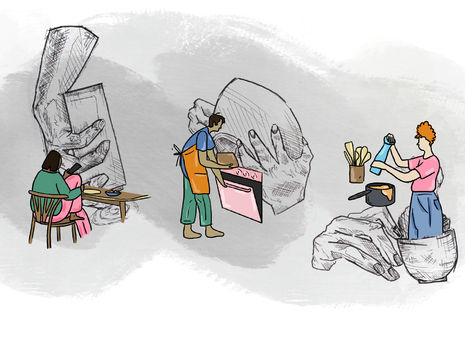The joys of student cooking
Finn Costello O’Reilly divulges the simple pleasures of cooking in a college kitchen

Food has long been appreciated as much more than the group of ingredients that ends up on your plate. It has cultural, social, and personal significance, significance which has been translated across continents and time. Despite this, I feel as if there is a growing tendency to treat food simply as a functional product. Social media has turbocharged the dissemination of food and health knowledge, which has been co-opted by the current cultural obsession with optimisation and self-improvement. Health and wellness gurus, all seemingly with the same grating vocal fry, wax lyrical about new must-have supplements or superfoods. Approaches to food that trade on time-efficiency and ease are ubiquitous; it’s hard to find recipes these days which aren’t: “Quick and easy, one-pot, etc!”
“The act of cooking is one grounded in personal, bodily experience”
Of course, these are positive changes in many ways. Having the resources to spend hours on elaborate meals is a privilege that few have, and increasing public understanding of the links between food and health could lighten the burden of preventable diseases. However, not extending any purpose to a dish beyond its nutritional value and speed of preparation reduces cooking to an exercise in efficiency, a means to an end. In other words, an obsessive focus on food’s content comes at the expense of appreciating its context. Throughout my two years at Cambridge, cooking has rarely felt like chopping wood to keep the fire going, but a key part of how I detach from work, experiment with new things, and socialise.
Setting its social functions aside for a moment, the act of cooking is one grounded in personal, bodily experience. You have tactile chopping; sounds of sizzling and bubbling; intricate, changing aromas and tastes working off each other; huge palettes of colours and textures. I cannot think of a multi-sensory experience more absolute or immersive. For me, this immersion is particularly important for detaching from the singular, cerebral attention of studying. Critically, when compared to my other post-long-day-in-the-library activity of choice – doomscrolling on Reels (or shamefully, after deleting Instagram, YouTube shorts) – it demands a more mindful and comprehensive kind of attention. Paired with a playlist and cold beverage of choice, I find it genuinely therapeutic.
“You are the cast, crew, and consumer in your own production”
In addition to this, I have found cooking to be of use in dealing with two specific feelings that often accompany uni life. Firstly, the internalisation of persistent academic pressure can manifest as a constant need to be productive. Well, there are few activities that, in the purest sense of the word, are as productive as cooking. You start with ingredients, and with some chopping, heating, or combining, end up with a material creation that can be consumed. The simplicity of this is welcome after hours spent studying and processing impenetrable content. Cooking is something that allows you to get much needed, and deserved, relaxation and detachment, while parrying the feeling of: “I’ve not done anything productive.” This is similar to the familiar logic of “productive procrastination,” where you often find myself doing chores instead of work, until you run out of clothes to wash and rooms to tidy.
Secondly, when deadlines begin to circle, it’s easy to feel a frustrating lack of control over our academic lives. By contrast, the kitchen is a space in which you can have absolute control over all proceedings. You are the cast, crew, and consumer in your own production. I suspect this is the reason why even the most mild-mannered people sometimes defend their hegemony over the kitchen with ferocious militancy. Perhaps the most annoyed I’ve ever seen my easy-going, relaxed brother Euan was when I had the nerve to stir a pot he was cooking with.
“There is a familiarity and intimacy involved at every stage that cements and deepens relationships”
Of course, if you are lucky enough to have one that can accommodate multiple people (unfortunately, not all college kitchens were created equal); kitchens are brilliant social spaces. Unlike “third spaces” like pubs, cafes or common rooms, they fall under the domestic sphere. As such, they can be the perfect setting for building a sense of family that allows you to settle in and feel at home at university. Certainly, my first year at King’s was anchored by our kitchen. The time I’d spend cooking, eating, and chatting with members of and visitors to our kitchen was key to a truly joyful year for me. The informality and mundanity of chatting in sliders and whatever clothes you grabbed first was a perfect supplement to the more structured, formalised outings of societies, events, and pub trips. Cooking also lends itself to this, occupying your immediate attention and allowing you to be more relaxed and unfiltered as a result.
Over the past two years, I have loved both cooking for friends and being cooked for. On the surface, the validation you get when you make a nice dish for someone is its own reward. As a guest, you can milk this… or so I’ve heard. Make your pal feel like Gordon Ramsay and you’ll have home-cooked meals as often as you want. But, if you’ll indulge me for a second, the significance of cooking for others runs deeper. A dear friend once told me that “acts of service are when I feel most purposeful and connected to others,” and cooking for someone is a wonderful example of this. From the first urge to do something nice for them, to the buying of their favourite ingredients (and avoiding those you know they detest), to the final garnishing with parsley or coriander, there is a familiarity and intimacy involved at every stage that cements and deepens relationships.
Now that I’m past the midway point of the holidays, I look forward to another year at Cambridge with cooking front and centre.
 News / Hundreds of Cambridge academics demand vote on fate of vet course20 February 2026
News / Hundreds of Cambridge academics demand vote on fate of vet course20 February 2026 News / Judge Business School advisor resigns over Epstein and Andrew links18 February 2026
News / Judge Business School advisor resigns over Epstein and Andrew links18 February 2026 News / University Council rescinds University Centre membership20 February 2026
News / University Council rescinds University Centre membership20 February 2026 News / Petition demands University reverse decision on vegan menu20 February 2026
News / Petition demands University reverse decision on vegan menu20 February 2026 News / Caius students fail to pass Pride flag proposal20 February 2026
News / Caius students fail to pass Pride flag proposal20 February 2026










